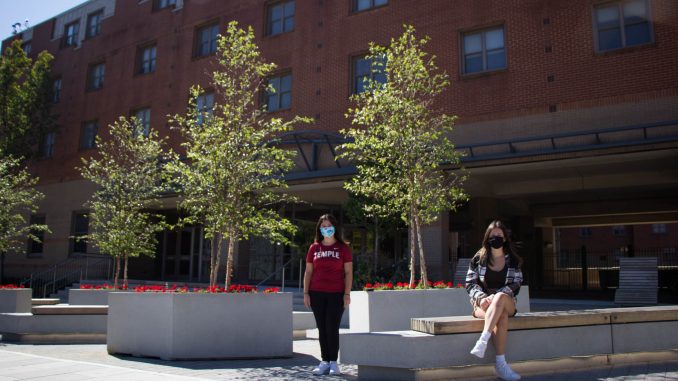
Walking the halls of 1300 Residence Hall, Eliza Needles couldn’t help but notice its emptiness only weeks after classes began.
“For the first two weeks, there were a good 30 people in every lounge on every floor at all times of the day,” said Needles, a freshman history major. “Now they’re pretty much empty during the day.”
Needles is among the students who chose to stay in their residence halls rather than return home to complete their semester of online classes. Some students stayed in their residence halls to remain productive in academics, keep family members safe and experience life on-campus.
On Sept. 3, Temple University announced it would suspend almost all in-person learning for the rest of the semester. Students in residence halls had until Sept. 13 to choose between remaining on campus or moving out and being fully refunded for housing and meal costs.
After more than 2,000 students cancelled their housing between Sept. 3 and Sept. 13, around 1,250 students remain in university housing, wrote Olan Garrett, director of residential life at The Office of University Housing and Residential Life, in an email to The Temple News.
More than over 3,400 students originally moved into residence halls for the fall semester in August, Garrett wrote.
Last academic year, 5,398 students lived in university housing, according to the Temple University 2019-20 Factbook.
When Temple reopened Main Campus, all residence halls opened except Johnson and Hardwick halls, which were converted to isolation and quarantine rooms for students, The Temple News reported.
Students who live on campus were asked to quarantine for two weeks prior to moving into residence halls in August and were tested for COVID-19 at the Aramark STAR Complex, The Temple News reported.
There are currently 61 active cases of COVID-19 on campus as of Sept. 21, The Temple News reported.
Students staying in residence halls are no longer permitted to visit other rooms within their residence halls as they were when halls reopened this semester, Garrett said. The discussion to relocate students within residence halls is being evaluated.
University Housing and Residential Life initiated the process of refunding students with the Bursar’s Office and students have begun receiving them within the last week, Garrett added.
Jack Hewitt, a freshman civil engineering major who lives in 1300 residence hall, wanted to stay on campus for the college experience, he said. He was concerned about the rise in COVID-19 cases at Temple, but was reassured once they began to flatten after Sept. 7.
“I like it here a lot,” Hewitt said. “Things are just more quiet, a lot more doors closed, things like that.”
In residence halls, some common spaces are open with reduced capacity limits, while others are locked, The Temple News reported.
“For me, it’s pretty much been the same, everyone I was close to ended up staying,” Needles said. “We haven’t changed everything, the lounges are like more empty, but it’s not that big of a difference for me I guess.”
Jennifer Mittelman, a freshman undeclared student, wanted to be on campus and felt that being in a new environment at 1940 Residence Hall would allow her to be more productive after spending her summer at home, she said.
“I was thinking of going home, but I really wanted to try to have the normal freshman college experience that I could, even though there are obviously things that are different,” she added.
Although her residence hall is a lot quieter, she’s noticed the remaining residents are making the effort to connect with each other. Mittelman and some friends knocked on other doors in the residence hall to meet people.
“Since everyone left, you kind of want to be friends, have a big family with the people that stayed because as a freshman and being online it’s hard to make friends,” she said.
Meghan Kelly, a freshman early childhood education major and resident in 1940 residence hall, decided to stay to make use of the money her parents invested.
Kelly is happy she stayed because she has the option to safely go to the city or on campus, but can still go home for a weekend if she wants, she said.
“There wasn’t much for me to do at home either,” Kelly added. “Here, I can go into the city safely with my roommate and have all of off campus to utilize.”
Before other residents moved out, Kelly said she would see people in the common rooms and walking together in the halls, but it has since gotten quieter.
“When I walk down the halls, I’ll notice a lot of the name tags that were previously there aren’t there anymore,” she said. “It just feels a lot emptier.”


Be the first to comment